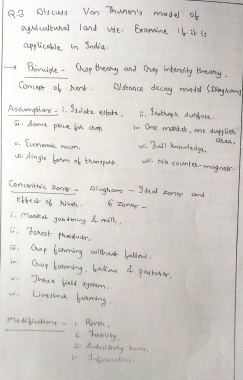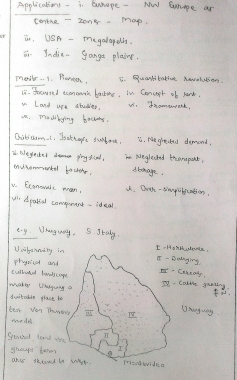Many aspirants are in constant confusion about notes-making. I personally have started notes-making many times just to end up tearing those pages. No doubt this leads to wastage of a lot of time. But you must remember that smart notes-making can help you study in a much better way. Let’s have a look at some important questions regarding notes-making.
WHY?
Why should I make notes?
On an average, a sincere UPSC CSE aspirant refers to 25-30 books. Since not everybody of us is an Einstein, we need to revise these books. So while revising you will need a lot of time to find that portion again and again, and read the full paragraphs from the book. Also, it is not possible to carry these books with you every time, especially during exam time. So you need to prepare a concise format of whatever important points you have read in order to revise them quickly and easily.
Further you understand the issue better if you write it down in a concise and organized form. This process helps you get an overview of the topic and will act as good as two revisions. The text in books is not organized as per our requirements. So you need to reframe and organize it in a manner most suitable to you. So looking at all these reasons, it is advisable to make notes.
HOW?
How can notes be prepared?
There are three basic characteristics of notes, whatever type you choose.
- Clear: Write down clearly so that you don’t need to refer the original text again and again.
- Concise: Be very crispy and specific. Points format is the best. Focus on those points which you find difficult to remember.
- Customized: Don’t follow any standard prototype. Draft note as you find suitable. And draft them keeping yourself in mind.
There are three basic types of notes making. The first and most conventional type is to summarize important points from books or other sources in a notebook or on a page. This is the most tried and tested method. But the problem here is that you end up preparing a mini version of the initial text. However the basic idea of notes is to note only points important to you.
Second is to underline major points and jot down important points on the book itself. But here a major limitation is that you still need to carry books with you. Further this makes the book clumsy and confusing.
Third is preparing answers in points format on the topic. Here you need to select one or two good questions on that topic and then simply draft an answer for it. Add all the ingredients of a model answer into it. And you can then keep on improving this answer as you get more information.
WHAT?
What should be my approach to notes making?
I would strongly suggest to follow the Question-Answer pattern for notes making. We all know answer writing is the key in CSE Mains. So by preparing this type of notes you will actually hit the right note of the requirement of the exam. Also you start developing the perspective of tackling questions.
However it is easier said than done. Handling many books for same subject or topic may create lot of confusion. Normally there will be one or two books which will cover 70-80% of the syllabus of that subject- let us call them Primary reference books. Find out these books first. For the remaining few topics, decide broadly what source you are going to use. Now be careful that you don’t waste days and weeks in deciding this list. Start as soon as you decide on the primary reference book.
Some sources you may not get initially. Those you can always look for after starting with the study. Further if you come across some other reference books of same subject, just see whether there is something new from syllabus as compared to your primary reference book. Point out those topics and study them only. These will be your secondary reference books. You can also refer these books for topics which you feel are not covered satisfactorily in your primary reference book. But always remember that there is no point reading same topic from 3-4 books. Additionally, you can use the ‘jotting on the book’ method for the primary reference book and the ‘summary’ method for the secondary reference books, pasting these short summary notes to the primary book itself.
WHEN?
When to make the notes?
Many aspirants believe that best notes are made during first revision i.e. second reading. But I would differ here. I find the first reading itself a good time for notes making. Let us imagine the whole study process. First of all, take a topic from syllabus. Then read the primary reference book or source that is already identified. Once you feel that you are getting what is written there, refer to the question papers/ question banks you have and pick up at least one question. Attempt that question without referring the book, no matter what quality is that answer. This answer maybe in points format, which will save time. You may feel embarrassed looking at the answer, but the idea here is to get oneself exposed. And keep this answer in a file. Keep on updating on the same paper during revisions whenever you get a new point about that topic, or when you find out some case study or linkage regarding that answer. So during revisions you are actually reviewing and improving your notes.
WHO?
Who should make the notes?
Sounds like a silly question, right? But there are many answers. Some people think some Coaching class or some publisher should make notes for them. Some find a good group and expect the sincere one from the group to make notes. Others think why to toil when some young officer has already made notes, which are hit in market. But the answer is YOU. Because you can make best notes for yourself. Draft them according to your strengths and weaknesses. So if I am not good at remembering numbers my notes should have the relevant numbers. Or if I find it difficult to remember plain text, I can organize the important points in a flowchart or ray-diagram. Do not make notes for the humanity, covering each and every point, as if you are going to publish it in market. Know yourself and make the note accordingly.
Sample Notes: Question-Answer format. From Geography Optional- Just to demonstrate the technique.
Click to enlarge.
I hope this will help you in making and managing notes. Many Coaching classes provide notes which are of good quality. But don’t stop there. Process them further to make them more clear, concise and customized. Notes of news articles and editorials is a different ball game which has been discussed in the article Current Affairs (Click to open). Also for basics of answer writing you can refer the article Answer writing (Click to open). Your focus while studying for CSE should be developing the knack of writing quality answers. And notes making can help you do that well.
And if someone is wondering about the use of Wh-type questions pattern in this article, well, that is to further press my insistence on making Question-Answer format notes!



Very nicely written Abhijeet .it will surely help the aspirants of upsc and also in general study purpose…
LikeLike
There are various apps. Regarding UPSC pre/mains would you suggest to use those apps?
LikeLike
Yes there are good apps for factual information. But key is to process information.
LikeLike
HellO sir, i have one doubt regarding your method. As you told that i should update the page while having subsequent revision. Subsequent revision should be from the primary source that has been identified?? When should i use this paper to revise?
LikeLike
Revision should be from primary source. However if you get some relevant new material or related information in current affairs, you should jot those points in notes. Here onwards these notes should become your primary source.
LikeLike
Sirji, you had written key to success, pure notes means sure success.
LikeLike